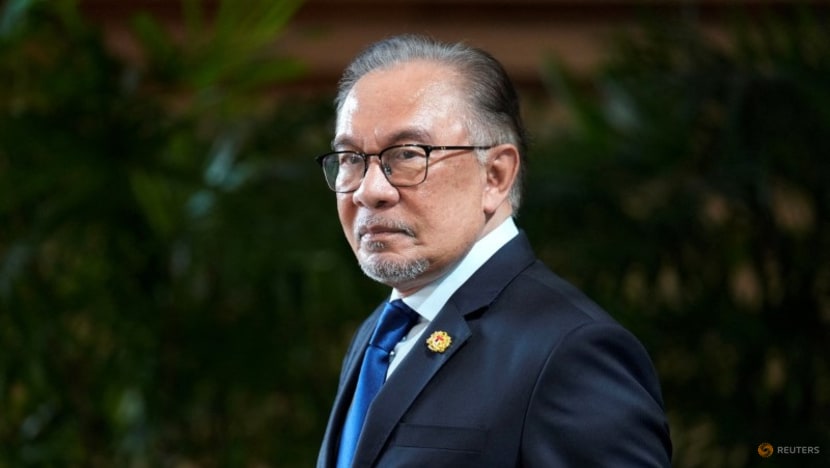Commentary: Anwar’s approach to Syria could boost Malaysia’s standing in global Muslim community
The fall of Bashar al-Assad in Syria presents Malaysia Prime Minister Anwar Ibrahim with an opportunity to reignite a network of alliances that had floundered in recent years, says Sophie Lemiere, a political anthropologist who specialises in Malaysian politics.


This audio is generated by an AI tool.
KUALA LUMPUR: A few days after the fall of Bashar al-Assad in Syria last month, Malaysia Prime Minister Anwar Ibrahim gave an address at a conference in Kuala Lumpur, calling for a peaceful transition of power free of sectarian divides.
“Sectarian divides must be rejected, and unity must be embraced as the guiding principle for rebuilding the nation,” said Anwar at the annual meeting of Russia-Islamic World Strategic Vision Group. Malaysia, he said, had a duty to support an independent and united Syria.
Since ousting Assad on Dec 8, rebel group Hayat Tahrir al-Sham, led by Ahmed al-Sharaa, has been keen to reassure the local and international community that it has moved away from its extremist past.
It has pledged to respect minority faiths and has promised to set up a government involving all segments of Syrian society.
The transition in Syria, after more than 13 years of civil war, presents Anwar an opportunity to champion Muslim democratic governance in a region rife with autocratic tendencies. It also provides him an opportunity to revitalise his image as a moderate Muslim back home in Malaysia, amid a rise of religious conservatism.
A TEST OF DIPLOMATIC SKILLS
When it comes to diplomacy, Malaysia is middle-power, and Anwar a medium-weight whose diplomatic skills have yet to materialise in something more than world tours and investment promises. His diplomatic acumen will soon be tested with his chairmanship of the Association of Southeast Asian Nations (ASEAN).
Anwar has long grappled with a complex legacy. Once a firebrand student activist who co-founded the Muslim Youth Movement of Malaysia in 1971, his departure from the Islamic movement, particularly after aligning with Mahathir Mohamad’s administration in the 1980s, has left him estranged from segments of his conservative constituency.
Two stints in jail for sexual offence charges - which Anwar has long claimed were politically motivated - nevertheless compounded a perception of betrayal among the more conservative crowds.
The shifting dynamics in Syria could offer Anwar an opportunity to reclaim his standing within the global and Malaysian Muslim communities, by advocating for a new governance model that resonates with moderate Islamic principles.
Anwar has made more than a dozen high-profile trips to the Middle East since assuming office in November 2022. While these visits have bolstered Malaysia's diplomatic presence, critics argue that Anwar’s foreign focus has come at the expense of addressing pressing domestic issues.
To address these concerns, Anwar must deliver tangible results from his diplomatic engagements. One way to do so is by building a constructive relationship with Syria’s emerging leadership.
The United States and the United Nations have already sent envoys to forge ties with Syria’s new leadership, signalling a shift in geopolitical strategy amid the remnants of Assad’s regime.
Meanwhile, while France and Germany’s foreign ministers have also met Syria’s new leaders, European nations remain cautious about aligning too closely with Islamic factions once labelled a terrorist organisation.
For Anwar, this presents an opportunity to promote stability in Syria while championing a moderate Islamic narrative. His historical ties to these movements, while forging a strong relationship to Western powers, could position him as a principal interlocutor, helping bridge divides while advocating for stability and humanitarian considerations in a politically fragmented region.
Moreover, Anwar's potential relationship with Syria's new leadership could hold significance in the broader context of the ongoing Gaza conflict. Establishing an ally in the region could give him strategic leverage as Malaysia seeks to position itself as a leader among Muslim-majority nations.
FORMING ALLIANCES
The crumbling of Assad’s dictatorship also presents Anwar with an opportunity to reignite a network of alliances that had floundered in recent years.
The 2011 victories in the post-Arab Spring landscape have been tempered by the fall of Islamic parties in Tunisia (2021) and Egypt (2013) - both of which have seen their influence markedly decline as autocratic leaders regained power.
Anwar, who benefited from old brotherhood friendships with Tunisia’s Ennahada party and the Egyptian Muslim brotherhood, has found himself without significant Muslim democrat and/or moderate allies in the Middle East-North Africa region. But Anwar’s long-standing friendship with Turkish President Recep Tayyip Erdogan, a major whose democratic credentials have largely been obscured by his heavy-handed ruling style, could open the doors of the new Syrian leadership. Türkiye has been a steady supporter of the Syrian opposition and the political change is a boost to its influence in the region.
The credibility Anwar could gain from supporting a new Syrian regime could empower him to advocate for peace and cooperation across the Middle East, thereby counterbalancing extremist narratives that threaten regional stability.
To capitalise on this momentum, Anwar could consider leading multilateral efforts - perhaps under the auspices of ASEAN - to facilitate discussions on critical issues such as post-war reconstruction, minority rights or economic cooperation with Syria.
This would not only showcase Malaysia’s commitment to fostering peace but also elevate Anwar's standing as a politician focused on regional unity rather than narrow, self-interested goals.
The last Malaysian leader to visit Syria was Abdullah Badawi, whose 2007 trip was aimed at boosting diplomatic ties and trade exchange with Arab countries.
Anwar Ibrahim now stands at a crossroads. His approach to Syria could reshape both his political legacy and Malaysia’s standing within the international Muslim community.
Dr Sophie Lemiere is a political anthropologist who specialises in Malaysian and Southeast Asian politics, and has held research and teaching positions in major universities across Europe, the United States and Southeast Asia. She is currently Adjunct Fellow at the Center for Strategic and International Studies, a Washington-based think tank, as well as Research Fellow at College de France in Paris.


















